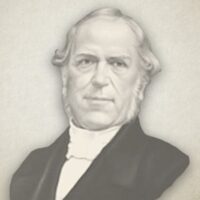
13 Duty Faith Speaks In The Terms Of The Mosaic Covenant
Duty faith goes by proposals to put the world of sinners in the same position for heaven and eternal salvation, as Moses addressed the Israelites, saying, ‘I call heaven and earth to record this day against you, that I have set before you life and death, blessing and cursing; therefore choose life, that both thou and thy seed may live,’ Deut 30:19. As though the world had only to make their own choice in believing, and so obtain salvation, or lose it; yea, more, be damned for not believing unto salvation when it was so proposed to them. But these cases are not at all parallel, because Moses did not hereby propose to the heathen world, much less made it their penal obligation to make themselves Israelites of the seed of Abraham and his seed, so as to possess that land in common with them, or to be cut off from the face of the whole earth for not being and doing all this. But Moses was speaking to them as Israelites, who were already Israelites of the seed of Abraham, not by their own doing, but of the Lord’s own will and power, and who were already initiated into all their privileges as the seed of Abraham, and into all the ordinances, statutes, and judgments of the Lord peculiar to the seed of Abraham. And the possession and enjoyment of their privileges in the promised land of Canaan, was their life here intended; and the loss of the enjoyment and possession of their privileges, through disobedience to the Lord’s statutes in the land of promise, was their death here intended. They were not hereby required to put themselves into any new character, as that of from unbelievers to believers, and from sinners dead in sin, to living saints; nor to put themselves upon any new premises; as that from aliens to citizens of the household of God; but honorably to maintain their character as the already distinguished seed of Abraham, by obediently observing the ordinances, statutes, and judgments of the Lord, in which they were now already initiated, and in which they now stood as a people, and which was the way of their figurative, civil and covenant life; while the disobedient neglect thereof was the way of their figurative, civil and covenant death as a people, Ezek 18; Hos 13:I. And as they did depart from the statutes of the Lord, and die in the sense intended, see their correspondent resurrection, at least of the two tribes of Judah and Benjamin, in Ezek 37. So that this portion of sacred truth cannot, in a gospel light and meaning, with any authority and parallel consistency, be applied to the world that lieth in wickedness; but it belongs to the admonitory and exhortatory branches of truth to the called and believing church of Christ, for their honorable regard of, and obedience of faith to the whole revealed will of God, as their own gracious God, Father and Saviour; and which is the way of life to their comforts, peace, and credit as Christians and professed followers of the Lord. As it is written, ‘in the way of righteousness is life, and in the pathway thereof there is no death,’ Prov 12: 28. ‘The judgments of the Lord are true and righteous altogether. Moreover, by them is thy servant warned, and in keeping of them is great reward,’ Psalm 19: 9,11. And ,they that observe lying vanities, forsake their own mercy, Jonah 2: 8.
John Foreman (1792-1872) was a Strict and Particular Baptist preacher. He was appointed the Pastor of Hill Street Chapel, Marylebone, serving this position for close to forty years.
JOHN FOREMAN'S LIFE AND MINISTRY
JOHN FOREMAN ON DUTY FAITH (COMPLETE)
JOHN FOREMAN'S BAPTISM AND COMMUNION CONSIDERED (COMPLETE)




